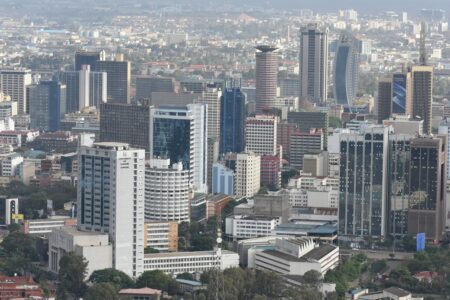- Africa’s new dawn: the rising role of digital and AI in agriculture
- Can Dangote Refinery Transform Africa Energy Ambition
- Gallup Survey: 80 per cent of Kenyan Workers Are Disengaged and Seek New Opportunities
- Madagascar Man Freed from 5KG Tumor After 15-Year Struggle
- How women in Africa are perceived and treated
- Sugar consumption in Kenya to Increase to 1.23 Million Tonnes
- Can Somalia and Turkey Oil deal Bring Change in Somaliland
- Remittances to Kenya dropped to $371.6 million in June, marking a six month low
Browsing: Kenya
- Remittance inflows amounted to $385.9 million in February, compared to $309.2 million in February 2023, an increase of 24.8 per cent.
- The cumulative inflows for the 12 months to February 2024 totaled $4.33 billion compared to $4.03 billion in a similar period in 2023, an increase of 7.5 per cent.
- The US remained the largest source of remittances to Kenya, accounting for 54 per cent in February 2024.
Remittances to Kenya continued on a growth trajectory in February, latest Central Bank of Kenya (CBK) data shows, as easing inflation in the United States saw the country maintain its position as the leading source of inflows.
This comes amid a positive projection for the year where World Bank has forecast a 2.5 per cent increase on inflows to Sub-Saharan Africa, with Nigeria, Ghana and Kenya as leading recipients in the continent.
Remittance inflows in Kenya amounted to $385.9 million in February, …
- Kenya has already enlisted over 107,831 community health workers through the Ministry of Health.
- The target cohort of 25,000 will be trained in the first phase, according to the Resilient and Empowered African Community Health (REACH) initiative.
- REACH will be implemented in phases, aiming to boost skills of the 107,831 community health workers employed by the Government.
Kenya has launched a community health initiative supported by the African Union geared to boosting primary health care at the grassroots, targeting under-served populations.
The programme, under the auspices of the African Union (AU) Member States, is known as Resilient and Empowered African Community Health (REACH) and is geared towards increasing Community Health Workers (CHWs) to over two million in the continent by 2029.
Under the first phase of the initiative, over 25,000 CHWs newly recruited in Kenya will be trained on community health and on the use of Community Health Promotion (CHP) …
- As national debts grow, many African countries find themselves spending more on debt than on health.
- IMF says the debt ratio in Sub-Saharan Africa surged to 60% from 30% of the countries’ GDP between 2013 and December 2022.
- Kenya is for instance using nearly 60% of its annual revenues on paying debt obligations.
As the Africa debt crisis roils, over half of the countries have found themselves spending more money in servicing their loan obligations than even the amount they have budgeted for health services to their citizens.
This unfolding scenario is further burdening millions of their citizens who have little choice but to shoulder heavy tax burdens to settle mountains of debt.
Prof Danny Bradlow, a Senior Research Fellow at the Centre for the Advancement of Scholarship in Pretoria, South Africa, captures the dire situation, stating: “over the last three years (2019/22), more than 25 African governments allocated …
- New regulations for crypto firms in Kenya will force players give evidence of sufficient working capital to continue business.
- Crypto firms will required to maintain core capital of not less than 12% of the total fiat value of the virtual assets held or proposed to be held in the custody of the platform.
- The Virtual Asset Service Provider (VASP) Bill also proposes that businesses dealing in digital assets in the country be allowed to operate as commercial entities.
Players in the digital assets and crypto currency space are now pushing for new regulations for crypto firms that will govern how new players join Kenyan market.
The digital asset industry lobby group, the Blockchain Association of Kenya (BAK), is among others, proposing the formation of a new regulatory sandbox that will test and regulate companies in the industry before their licensing.
Additionally, the Virtual Asset Service Provider (VASP) Bill, …
- These businesses, along with their affiliates in Kenya, Uganda, Somalia, Cyprus and UAE form the backbone of a sophisticated network that launders millions of dollars for Al-Shabaab.
- US says firms such as Nairobi-based Crown Bus Services and other investment projects that masquerade as legit commercial ventures, empower Al-Shabaab’s lethal agenda.
- Al-Shabaab is estimated to siphon over $100 million per year from the regional and global financial system.
The US, through its Department of the Treasury’s Office of Foreign Assets Control (OFAC), has cast a wide net across the UAE, Kenya, Uganda, and Somalia, targeting entities and individuals with wide-ranging sanctions for their complicity in financing Al-Shabaab terror network.
This designation, enveloping 16 entities and individuals, reveals the intricate web of financial operations spanning from the Horn of Africa to the opulent corridors of the United Arab Emirates (UAE) and the serene island nation of Cyprus.
This sprawling network, carefully pieced …
- Kenya’s private sector activity and new orders rises for the first time in six months.
- Selling price inflation hits long-run average as cost burdens ease.
- However, PMI shows lowest confidence towards future output in the survey’s history.
Kenya’s business conditions improved in February, expanding private sector activity due to a further softening of inflationary pressures supported a fresh increase in new order volumes.
Stanbic Bank Kenya Purchasing Managers Index (PMI) for February registered at 51.3 per cent as lower fuel prices helped to cool input cost inflation to a 26-month low, supporting the softest increase in output prices for one-and-a-half years.
Improving business conditions are said to have led Kenyan companies to expand staffing levels at a faster rate albeit by largely hiring casuals pointing to a cautionary stance towards hiring permanently.
Nevertheless, confidence regarding future activity fell to a survey low, suggesting a broad degree of uncertainty that activity …
- With the funding for growth, Lapaire intends to open 300 eye care centres.
- Eye care in developing countries like Kenya and many other African states remains underfunded.
- While it initially began with a B2B sales approach, it has since abandoned that model, favouring direct contact with the customers.
Kenya-based Eyewear Startup Lapaire has secured $3 million (KSh476 million) in private equity funding for growth initiatives across African markets. Following the deal’s closure, Lapaire intends to open 300 eye care centres, targeting 80 new outlets by December 2024.
Impact investment fund Investisseurs & Partenaires (I&P) led the equity round with AAIC, FINCA Ventures, and Beyond Capital pitching in. Cross-Boundary provided advisory support for the deal through USAID’s Africa Trade and Investment activity.
“Over the last few years, we worked hard to build a highly scalable model and we are now in the best position to accelerate our growth to positively impact …
- UNEA-6 yielded 15 resolutions, two decisions, and a ministerial declaration, underscoring the commitment of member states to collaborative action.
- These resolutions span a broad spectrum of environmental concerns, from the management of metals, minerals, chemicals, and waste.
- They also touch on environmental recovery in conflict-affected areas, water resource management, sustainable lifestyles, and the rehabilitation of degraded lands and waters.
The sixth session of the UN Environment Assembly (UNEA-6), which concluded last week in Nairobi, Kenya, marked a leap in the journey toward united global environmental governance.
Under the banner of addressing the triple planetary crisis—climate change, nature loss, and pollution—UNEA-6 brought together over 5,600 participants from 190 countries.
This assembly, held at the UN Environment Programme (UNEP) headquarters, was not just a meeting; it was a chance to the global community’s resolve to forge effective, inclusive, and sustainable solutions to the most pressing environmental challenges of our time.
UNEA-6 settles
…- Anti-Money Laundering watchdog removed Uganda from its grey list
- Treasury said Kenya underwent an assessment conducted by the Eastern and Southern Africa Anti-Money Laundering Group (ESAAMLG) in 2022.
- CS Ndung’u said the move underscores the need for swift action to bolster Kenya’s compliance efforts.
Finance Action Task Force (FATF), the global anti-money laundering watchdog, has placed Kenya on a list of 23 countries that are ‘not doing enough’ to fight money laundering.
FATF placed Kenya on its ‘grey list’ while Uganda has been removed from the list. The decision to put Kenya on the grey list might diminish Nairobi’s position as the financial enike air max 90 futura kansas city chiefs crocs sac à dos eastpak air max 270 women sit top kayak smith and soul nike air max 90 futura dallas cowboys slippers mens latex hood borsa prima classe custom kings jersey custom kings jersey jordan proto …
- Africa continues to grapple with food insecurity exacerbated by climate change and inadequate access to financing for both startups and food producers alike.
- In response, innovators and bold entrepreneurs are going digital, devising modern solutions to enhance food production.
- At the Africa Tech Summit in Nairobi, agri-innovation startups Homemade by Dropp, Koolboks, Samalife, BWS, Hello Tractor, Seabex and ReNile shared their entrepreneurial journey and reasons why they need financing to create value for farmers and consumers.
A number of startups with a focus on digital agricultural innovation in Africa are seeking fresh financing to scale and accelerate their growth across the continent, which is currently under pressure to feed a rising population.
These startups are eyeing opportunities in climate smart agriculture in Africa, the new frontier for business expansion globally.
Currently, agriculture remains the continent’s largest industry and employer. The industry is, however, facing significant challenges across the value chain, …














